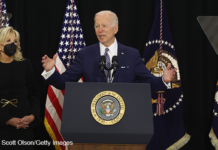By Jonathan Ellett
FAIR
California Governor Gavin Newsom (D) recently signed into law Senate Bill (SB) 1174, which effectively outlaws all local governments from enacting any law that requires their residents to provide valid identification before voting. Enacting this legislation ensures that only the State crafts election rules, leaving local governments no opportunity to safeguard electoral integrity in their own communities.
California’s new law is sweeping in scope. SB 1174 prohibits local governments from implementing laws to verify a voter’s identity at the polls and prevents localities from enacting “any charter provision, ordinance, or regulation requiring a person to present identification for the purpose of voting or submitting a ballot at any polling place, vote center, or other location where ballots are cast or submitted” unless otherwise required under state or federal law.
To ensure that there are no loopholes, SB 1174 ensures that its provisions apply to every conceivable jurisdiction. It defines “local government” to include not only general law cities, but charter cities as well. While general law cities are obligated to abide by state law, charter cities derive special privileges due to the fact that the State Constitution grants them “supreme authority over ‘municipal affairs.’” Under the State Constitution, these “municipal affairs” include the conduction of city elections and the authority to determine how officers and employees “shall be elected or appointed.”
Not surprisingly, it was one of these charter cities that was the impetus for SB 1174. In March, nearly 54 percent of Huntington Beach voters passed Ballot Measure A which amended the city charter to require voter ID in all municipal elections beginning in 2026. Measure A further stipulated that if there was conflict between the State’s elections code and the City’s charter, “the provisions of this Charter shall control and prevail.”
Following Ballot Measure A, state senator Dave Min (D-Irvine), whose district includes Huntington Beach, introduced SB 1174. Min stated that his motivation was to prevent “100 different charter cities [from] making up 100 different sets of voting rules, based on fringe conspiracy theories.”
Once introduced, the California Senate passed SB 1174 by a vote of 30-8. Shortly thereafter, the California Assembly voted 57-16 in favor of its passage. Governor Newsom signed the bill into law on September 29.
But even before the passage of SB 1174, the adoption of Ballot Measure A in Huntington Beach caused a firestorm in Sacramento. California Attorney General Rob Bonta and California Secretary of State Shirley N. Weber, Ph.D. filed a lawsuit on April 15 arguing that Ballot Measure A is preempted by state law.
The lawsuit alleges that Measure A conflicts with the State’s elections code. The complaint asserts that if “local law conflicts with state law reasonably tailored to the resolution of a statewide concern, the local law is preempted and invalid.” The lawsuit claims that despite the provision in the State Constitution granting charter city Huntington Beach the ability to control its municipal elections, Measure A is preempted because voter eligibility and one’s right to vote are “statewide concerns.” AG Bonta said, “The right to freely cast your vote is the foundation of our democracy and Huntington Beach’s voter ID policy flies in the face of this principle.”
However, Huntington Beach City Attorney Michael Gates, who is defending the City in the lawsuit disagrees. He stated that the “bill means nothing to the City of Huntington Beach. The city is going to proceed with its voter ID laws because it has a constitutional right to do so.”
While the case is being decided, California will remain one of only fourteen states that do not require identification to be presented as a requirement to cast a ballot. Under § 20107 of California’s Code of Regulations, proof of identity is only required when the federal Help America Vote Act (HAVA) requires it. Therefore California, relying on HAVA, only requires presentation of ID at the time one registers to vote rather than at the time the ballot is cast, subject to a few minor exceptions.
















